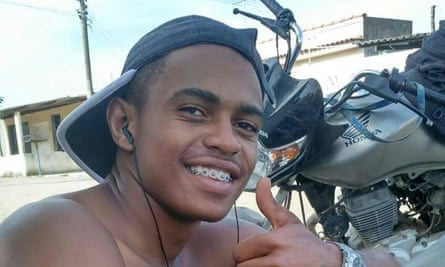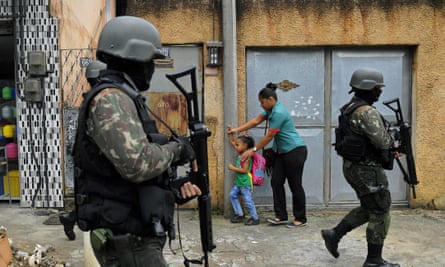Police with automatic rifles slung around their necks stood behind an armoured car near the entrance of the Salgueiro favela, a half-hour drive from Rio across the Guanabara Bay.
Nearby, Joelma Milanes, 38, cried as she recalled the night last November when she and her husband found her son Márcio Sabino, 21, lying dead with several others after a police and army operation.
The army told the Guardian its special forces battalion – Brazil’s equivalent of the US Navy Seals – participated in the operation which left seven dead, but denied they fired the shots.
“The people who should be protecting us are killing us,” Milanes said. “They do what they want. There won’t be justice.”
Such concerns have intensified since 16 February, when President Michel Temer declared a “federal intervention” in Rio de Janeiro state, putting a general in charge of its police forces, prisons and security.
On Monday, Temer announced the creation of a new extraordinary ministry of public security and appointed another general, Joaquim Silva e Luna, as minister of defence.
Since Temer sanctioned a new law last October, investigations into civilian deaths during police actions by the armed forces have been handled by military courts and prosecutors. But Human Rights Watch says the army is stonewalling an investigation into the Salgueiro massacre, whose death toll rose to eight after a victim died in hospital.
And while the “federal intervention” has the support of Rio’s middle and upper classes – spooked by rising crime – poorer Brazilians like Milanes, who works in garbage recycling, are apprehensive.
“I think it will get worse,” she said. “It’s not a solution.”
Violent crime has risen in Rio as a mismanaged and deeply corrupt state government slumped into financial and administrative chaos. Rio’s former governor has been jailed for graft and the state is so broke it can’t even afford to maintain police cars, while armed drug gangs have extended their reach over towns like São Gonçalo.
Their dominance is evident in Salgueiro, where bare-chested gang members patrol the favela on motorbikes. The letters CV daubed in red on walls signal that the neighbourhood is controlled by the powerful Comando Vermelho (Red Command) gang, which monopolizes drug sales. After cargo heists, trucks are parked here and merchandise sold quickly and cheaply.
“Food and electrical goods go very quickly,” said one resident, who spoke anonymously for fear of reprisals.
The favela, which borders a forest and a swamp, is desperately poor. As in many such communities in Rio, the government’s presence is barely felt, and gangs and evangelical churches have filled the vacuum.
Pastor Pedro Oliveira, 39, who runs the Projeto Sara Me church, spends more time handing out food baskets and helping residents than he does preaching.

“We are a social support,” Pastor Oliveira said. “All the support you can imagine.”
Like many Rio favelas, Salgueiro hosts outdoor parties, called bailes, where music blasts until dawn. There was a baile on the night Márcio Sabino was killed, but his mother says he had just gone out to get something to eat.
According to reports by local media, El País and Human Rights Watch, the army and police had staged an operation in Salgueiro a few days earlier, dropping soldiers into the adjacent forest from helicopters. But the gang members they were pursuing were warned and fled unscathed.
A second operation took place in the early hours of 11 November. Callers to a phone line to denounce police abuses reported men rappelling from helicopters into the forest hours earlier, around 11pm. Survivors told El País that shots came from the forest before men in black in helmets, with laser sights, emerged from the trees.
The army has said soldiers and police took part in a joint operation in armoured vehicles on 11 November. Initially it said they were fired on. It now says the soldiers heard intense gunfights and found the bodies on the road but were not involved in any confrontation.
Brazilian police are not equipped with sophisticated military equipment like ballistic helmets and laser sights, but the army’s special forces battalion has snipers, helicopter experts and night vision goggles, according to an article by Rio’s O Globo newspaper. The army denied to O Globo that special forces troops – nicknamed “ghosts” – had taken part in the operation.
But on Monday, an army spokesman told the Guardian that special forces battalion soldiers were in one of the armoured vehicles involved.
When Joelma Milanes and her husband, Claudio Lopes, 50, reached Salgueiro from their neighbourhood, they saw four bodies spread on the dark road.
She said that police stopped them approaching the body of her son, whom she said had never been involved in crime. “They put a gun in our faces,” said Lopes.
A photo later circulated on Facebook showed the victims’ bodies in a pile, “like they were garbage”, his mother said.
State prosecutors are conducting an investigation into police involvement but have been unable to interview the soldiers who took part, said Paulo Cunha, one of the prosecutors.

In December, the military prosecutor running the army’s investigation interviewed soldiers involved in December in Goiânia, capital of Goiás state – where the special forces battalion is based. A spokesman said military prosecutors were still waiting for testimony from police officers and ballistics evidence.
Police are also investigating but did not respond to questions from the Guardian.
Neither they nor any of the civil or military prosecutors have interviewed Joelma Milanes.
There have been 29 military operations in Rio since 2001 but not one has produced lasting results, said Luiz Soares, a former national security secretary. He said militarized interventions ignored structural problems, such as the dominance of drug gangs in Brazil’s overcrowded prisons.
“These are reactive policies to put out fires. But they do not address the causes of the fire,” Soares said.
In a statement to the Guardian, the army highlighted “positive results” in previous operations, such as during the Olympics and World Cup, and suggested that if intervention was successful, it could even be used in other states.
Retired Gen Gilberto Pimentel, the president of Rio’s Military Club, which often acts as a voice for officers not permitted to give interviews, told the Guardian he was concerned there would be “collateral effects”.
“We are going to act in communities that are dominated by the bandits,” he said. “It is very difficult to separate the good people from the bandits.”
